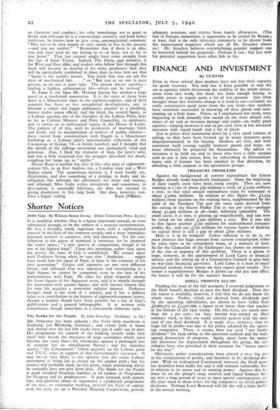FINANCE AND INVESTMENT
By CUSTOS
EVEN in these critical days markets have not lost their capacity for quick recovery. Not only has it been possible to stop the rot in equities which threatened the stability of the whole invest- ment front last week, but there has been enough buying to enable prices to regain quite a lot of lost ground. Just what brought about this welcome change it is hard to say—certainly no really constructive good news from the war -front—but markets have somehow succeeded in throwing off their gloom and sum- moning up a little hope. Prices, as I emphasised last week, were beginning to look absurdly low except on the most dismal esti- mates of air raid or invasion damage and yields---,on really good equities—ranging between 6 and to per cent. have at last attracted investors with liquid funds and a bit of pluck.
Just as prices were hammered down by a very small volume of selling, so they have been levered up in many instances quite disproportionately to the buying. Markets are thin and with sentiment itself veering rapidly between gloom and hope, we must obviously be prepared for fluctuations. My advice to investors is to hold on, and to those who have a little surplus cash to put it into action, first, by subscribing to Government loans, and, if honour has been satisfied in that direction, by affording a little, support to the speculative groups..
TREASURY PROBLEMS Against the background of current expenditure the Simon Budget already looks hopelessly inadequate. Since the beginning
of- June supply, costs have been, rising steeply. They are now running at a rate of about £60 millions a week, or £3,000 millions a year, so that total annual expenditure must be estimated at about £3,600 millions. In relation to this figure the £1,234 millions from taxation on the existing basis, supplemented by the yield of the Purchase Tax and the extra sums derived from the raising of the Excess Profits Tax to too per cent.—perhaps about £1,400 millions in all—looks definitely unhealthy. The small saver, it is true, is playing up magnificently, and can now be relied on for about £500 millions a year. But if you add to that figure another £350 millions for undistributed company profits, &c.' and say, £7oo millions for various forms of drawing on capital there is still a gap of about £800 millions.
How is it to be bridged? Unless inflation is to do it, we must abstract this huge amount from current consumption either by extra taxes or by compulsory loans, or a mixture of both. So far the Chancellor of the Exchequer has shown no awareness of the size or urgency of this problem. There is a gleam of hope, however, in the appointment of Lord Catto as financial adviser, and the setting up of a Consultative Council to give help on war-time financing questions. Lord Catto is a man of much practical wisdom, from whom we may expect good results. The sooner a supplementary Budget is drawn up and put into effect, the better it will be for the nation's finances.
SHELL PROFITS SLUMP Pending the issue of the full accounts I reserved judgement on the Shell board's decision to pass the anal dividend. Now that the report is available, however, I feel that we do not know the whole story. Profits, which are derived from dividends paid by the operating subsidiaries, are shown to have fallen from 0,680,373 to £2,527,766, a figure even lower than that reached at the bottom of the 1931 slump. On this basis, not much more than the 5 per cent., tax free interim was earned on Shell ordinary stock, so that one could scarcely quarrel with the omis- sion of any final dividend. It is made clear, however, that the huge fall in profits was due to the policy adopted by the operat- ing companies. These, it seems, have not paid "any further dividend" for 1939 owing to the uncertain outlook and the wide- spread destruction of property. Again, apart from the normal full allowance for depreciation throughout the group, the sub- sidiaries have also provided in their accounts for "losses caused by the war."
Obviously, policy considerations have played a very big part in the computation of profits, and therefore in th: dividend deci- sion. With its widespread Continental interests the Shell grow) has doubtless been badly hit, and it still remains vulnerable, both in relation to its assets and its earning power. Against this fact must be set the group's large reserves and liquid finances buift up over a long period of years to meet special contingencies, an the clear need in these times for big companies to avoid panicky decisions. Perhaps Lord Bearsted will lift the veil a little farther at the annual meeting.






























 Previous page
Previous page